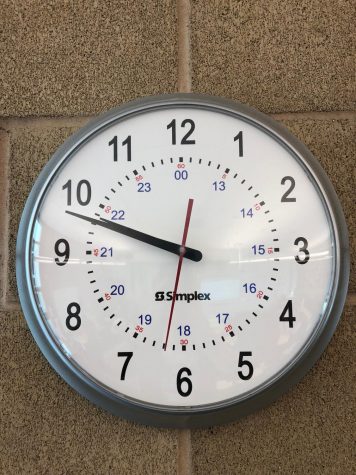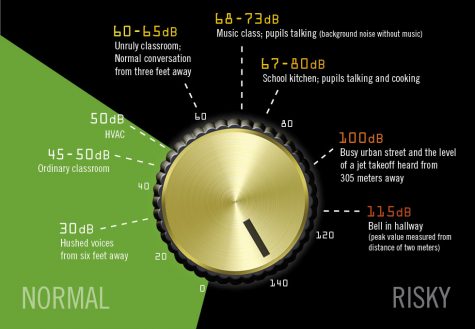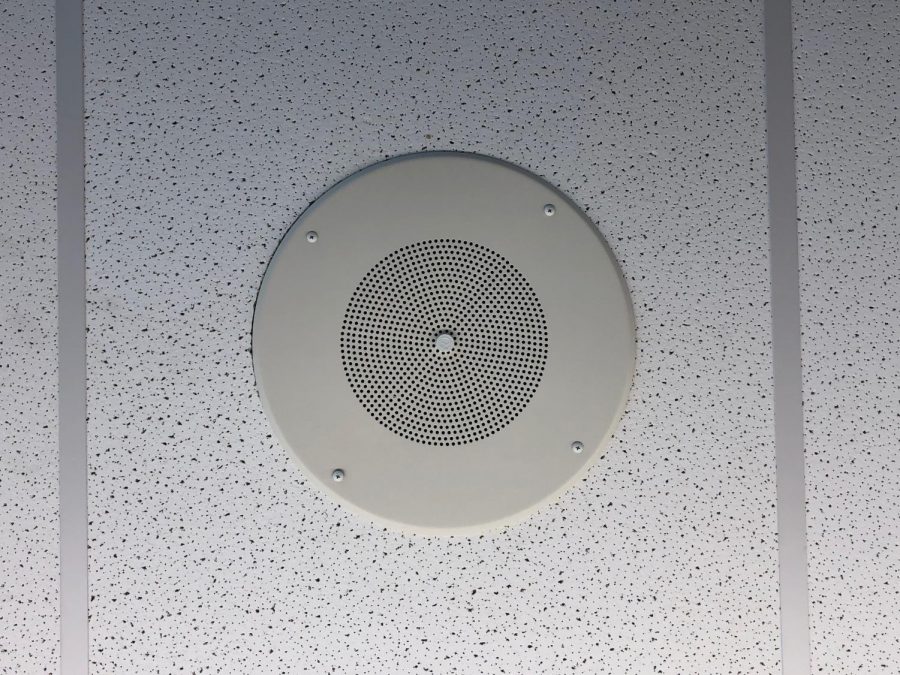The Benefits of Banishing Blaring Bells
Your typical school bell on the Sage Creek campus is run through the PA system. Although unassuming, on the roof of every classroom, its screams can damage students ears on the daily.
The bell rings.
They head out of their rooms. In the quad, they spend time with their friends.
The bell rings.
They go back inside, not to classrooms but to prisons.
The school has become a prison — the students, prisoners and the teachers, wardens — due to the blaring of the school bell.
The bell’s ever so harmonious toll reminds the students once more that they have no say in their daily routine, so the two weeks of AP testing were a blissful release, and the silent times were not lost upon the student body. Smiles permeated the walkways instead of the usual cold glances; but as the alarms come back into phase, students’ demeanors change once more, but now they start to question why are the bells there in the first place.

Thanks to modern technology, clocks are now omnipresent in the school campus. Their presence allows for students to know what time of day it is, without the school bell.
High school is a place of learning about how to become a well operating member of society, training students in the skills they need to survive: writing, reading comprehension and math, but apparently, time management did not quite make the cut. I’ve never heard of an alarm bell ringing at the start and end of every meeting and lunch in the workplace. The preparation for the real world or college is incomplete, if you do not train students to have a fraction of the independence we will have down the road.
Bells have been used in schools since their founding to signal the start and end of classes, but their use nowadays seems simply one of habit rather than importance. Back before every student had a watch on their phone, or a clock on the wall of the classroom, bells were needed to keep students on task and on schedule. Modern technology, however, has allowed for this archaic system to become just that: archaic. Students do not need to be Pavlov’d into submission anymore to make sure we show up to class on time.
The bells are also simply not accurate in telling students what to do. Any student in high school can attest to a teacher that claims, “I dismiss you, not the bell.” But if the teacher tells us when to leave, then why do we continue to suffer hearing damage for no reason? Their use is merely an outdated tradition we take part in for tradition’s sake while causing damage to students hearing.
Data from the Center for Hearing and Communication claims that even in elementary schools, bells were often 20 decibels above dangers levels, and this holds true at Sage Creek whose decibel levels were found to be well over safety levels through empirical testing. Although the short bursts of loud might not be too damaging just as a one-off, their repeated use can be.

A simple graphic showing the decibel levels of school noises. Research on hearing loss claims that noises above 85 decibels can lead to hearing loss over extended times.
At Sage, the bells ring for about three seconds 57 times per week on a typical school week. This puts students at just under three minutes of damaging levels per week. This number becomes even more outrageous when you look at a school year and a high school career which come out to nearly two and eight hours respectively, well into damaging levels, without even taking into account extra bells during assemblies and other non-standard days.
Those who argue in favor of the bells claim that the student body needs them to keep things running smoothly, but this simply is not the case. We already know from our extended experimental phase of AP testing that students, teachers, admin and classified staff can get on just as fine without them. So, saving our hearing by getting rid of them will not create panic in the walkways.
In fact, getting rid of the bells is one of the easiest ways to improve our campus. With the push of an off button, Sage can teach its students an important life management skill for any job with no difficulty or expense. And who knows, it may even bring back the light of a smile in our unusually cloudy season.



Connor ◊ Jun 3, 2019 at 10:27 am
Yes, in many cases a bell is not needed in a workplace, and I do think that school is no different from that. Only specific workplaces such as the fire and police departments run on bells and only because what those workers do is extremely important.
Christian Rocha ◊ Jun 3, 2019 at 9:06 am
The bell should just be 20,000hz noise for 30 seconds
Christian Rocha ◊ Jun 3, 2019 at 9:05 am
scary beell loud noise hurt ear please make no more
Aubrey ◊ Aug 25, 2023 at 4:23 am
I have sensitive hearing and an SPD but my school bell is really quiet so no one gets disturbed. I’m grateful that my school doesn’t want to hurt student’s ears while still making sure they manage their time in and between classes.
Alex Mathios ◊ May 31, 2019 at 1:30 pm
Great article! I’ve never really thought about how the intensity of the bells affect our auditory health, so this is a thought provoking article. The introduction was a bit overdramatic, I will say, but I agree with the reasoning behind the rest of the points. I do have two questions/ideas on the article:
1. The story focuses on the between-period bells and how loud they are, but completely ignores the issue of the fire alarm bells, which are both much louder and much more prolonged. While the fire alarm bells do not occur regularly, they are so ear-splitting and disrupt the day so much when they occur that I think they deserve some mention. We all hate it when the fire alarm goes off in the middle of a lecture or worse, a test (as they seem to do about every month), and I would not be surprised if it caused some form of hearing damage
2. While I agree that, given the evidence you provided, the bells can be harmful to students, I do think they are still important for time management in the first trimester of the year. This would be most important for Freshmen, because they may not yet be acclimated to the school’s schedule. Coming from Aviara Oaks, which has an 8 period day, I know that the bells helped me get used to the longer periods. So, perhaps instead of doing away with them altogether, the bells should only be used in the first month or so to help acclimate new students?
sophia ◊ May 31, 2019 at 12:07 pm
Good job nice Pavlov’s Dogs allusion! Also nice alliteration in the title.
Kevin ◊ May 31, 2019 at 12:03 pm
just have it be an actual bell noise and not an ear grape noise
Bryce ◊ May 31, 2019 at 11:04 am
what if instead of the bell it just said “bruh”
duke ◊ May 31, 2019 at 11:01 am
The bell is a shepard, and we are its sheep. Order is necessary for the greater good.
Jack ◊ May 31, 2019 at 9:26 am
I disagree with this article. I think you have gone down the slippery slope logical fallacy, where you argue the bells are the cause . The bells do not cause the school to “become a prison,” (Hull 5). It comes down to simple logic; how else are we supposed to divide the class periods? During AP Testing, my teachers would often either let us out too early, or let us out long after the period was supposed to end. It becomes too much an inconvenience to pay too much attention to the time. Teachers should be focused on teaching, students should be focused on learning, and the bell technicians should be focused on setting up the bells on time.
The point on bell noise is valid. Perhaps a better solution would be lowering the bell volume- instead of replacing the bells outright.